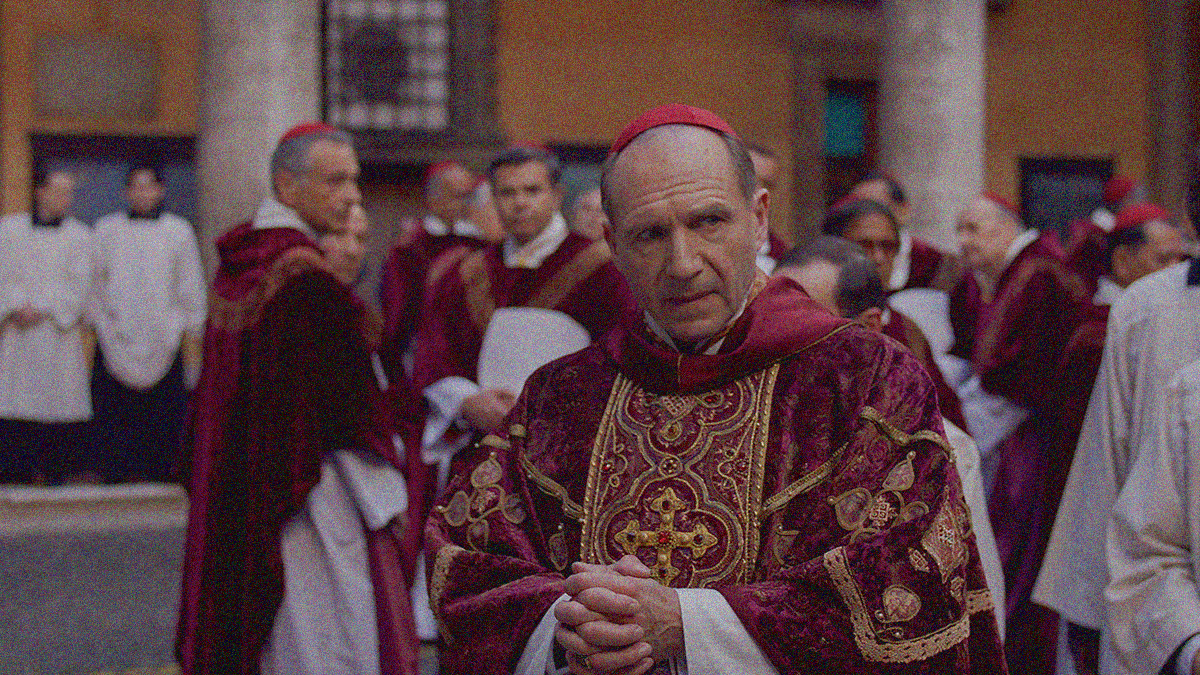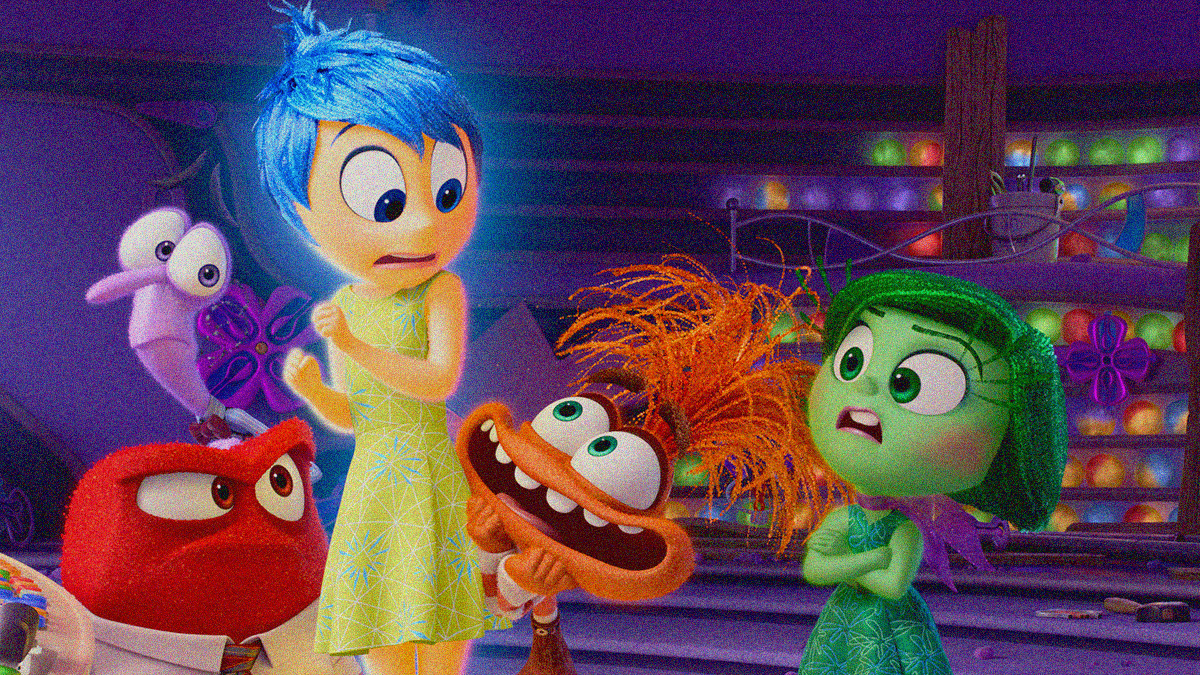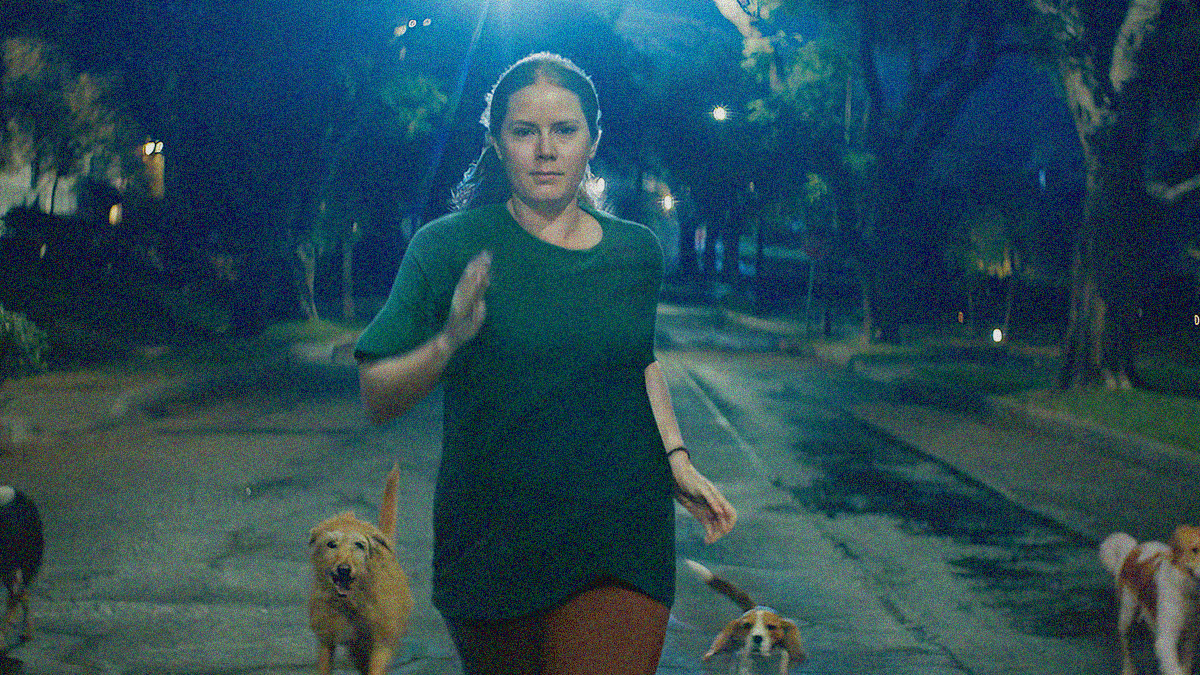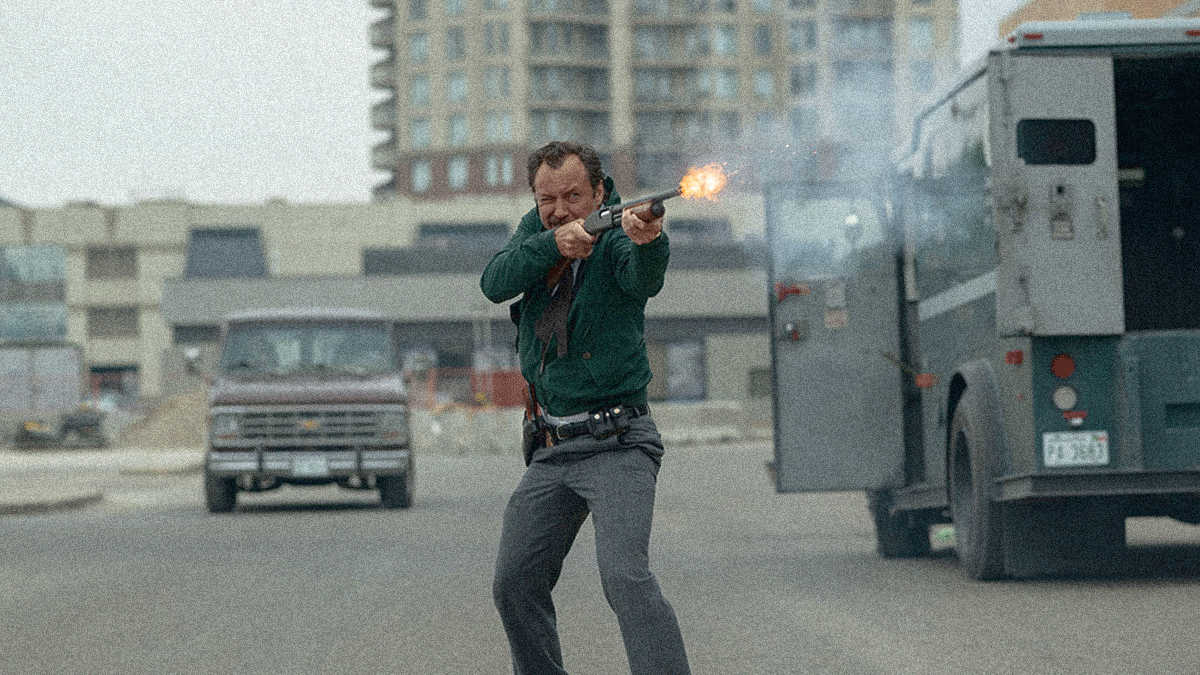December has arrived. Time to pick my 2024 faves.
Films. Posters. Music.
That last one is pretty much set. My end of year mix is inked and ready to print jackets and burn CDs. Previous years available here.
I’d like to get going on posters sooner than later since I have a tendency of not starting until after Christmas. I didn’t keep up with international sheets as much as I had hoped this year, so I have some work ahead of me. Previous years available here.
As for the films: well, that’s never-ending. I do have deadlines, though. The Film Stage aggregate is due 12/9. Indiewire’s Annual Poll is due 12/11. GWNYFCA nominations are due 12/18. OFCS nominations are due 1/14. So, it becomes a sliding scale of sorts where I try to watch the titles I think I’ll like most and work down the list.
Here’s hoping the last couple studios (mostly A24 and Focus) come through with screeners soon to catch-up on BABYGIRL, QUEER, THE BRUTALIST, and NOSFERATU. It’s not looking good, though.
Thankfully, there’s no shortage of other great films to watch instead.
What I Watched:
CONCLAVE
(VOD/Digital HD)
Towards the end of Edward Berger's Conclave (adapted by Peter Straughan from Robert Harris' novel), a revelation that we have known for quite some time is finally brought to light for the characters on-screen. Their reaction is as we would expect—including that of Cardinal Tedesco (Sergio Castellitto). Because while everyone else is frozen in shock, he sassily places his vape pen in his mouth for a pointed drag. It's such a small little thing and yet it speaks volumes towards the tone that runs throughout this papal "thriller." One that trades in pulpy theatrics, heightened melodrama, and an overall silliness that both contrasts its narrative severity and is ultimately produced from it.
The result is extremely entertaining even if the stakes are never as high as the film believes. Sure, voting for a new pope is a serious endeavor. I get that as a lapsed Catholic even if I couldn't care less. We might be talking about an antiquated position of power, but it remains an important one to those who adore the title as well as those who are affected by the words (decrees to the former) spoken beneath its mantle. So, the decision does come with a heavy responsibility. One that Dean Lawrence (Ralph Fiennes) takes to heart even if that same organ is no longer secure in its faith. The question then is whether the sanctity of the process outweighs the sanctity of the office itself.
If that sounds suspiciously like a different series of elections held much closer to home, well, I don't think it's a coincidence. Harris and company are obviously using the papacy as a metaphor for what's been happening in the United States as tribalism replaces morality where politics are concerned. It's hardly subtle when the presumed favorite (Tedesco) is drawn as a "traditionalist" who wants to roll back sixty years of reform to "make the papacy great again." Nor is it when those he's fighting against (the "liberals") are led by Aldo Bellini (Stanley Tucci)—a "good guy" who doesn't even want the crown. Add Lucian Msamati's Adeyemi (unworthy to Tedesco because of Tedesco's racism and Bellini because of Adeyemi's bigotry) and you get a three-headed monster.
It's not just Rome's Trump, Biden, and Stein, though. There's also their Harris by way of Lawrence himself. Here's a guy who wanted to resign but was refused by the late pope. He's fully behind his friend Bellini, but also willing to back Adeyemi despite his negatives because anyone is better than Tedesco. And, when push comes to shove, he might even accept the nomination himself if enough outside noise tells him he's the "last line of defense." Unlike America, however, Bellini doesn't have to step down for Lawrence to start earning votes. All four end up on the ballot alongside Tremblay's (John Lithgow) scandal-waiting-to-happen and Benitez's (Carlos Diehz) soft-spoken stranger nobody knew existed until the conclave commenced. Buckle up for a long sequestering.
I'll say this about the metaphor: it's blunt but effective. It gets the wheels moving as far as where the tides start turning and provides Lawrence ample opportunity to go beyond his scope for the truth or wring his hands and let "God decide." Brían F. O'Byrne and Isabella Rossellini arrive for brief but memorable counsel while Fiennes shines to really elevate his character from the otherwise thin material. Because there isn't that much here beyond the play to hold viewers accountable for their own tribalistic tendencies. That Fiennes imbues Lawrence with such altruistic passion and unwavering strength in the face of corruption is a testament to his craft more than the script. Even if his day one homily is very well-written too.
Where things fall apart for me, however, is in the so-called "twist." That's what I've been hearing it called ever since TIFF, but I think the term "bombshell revelation" is more apt since it doesn't impact the actual plot. Its purpose is to instead impact us. Well, I thought it was beyond naïve. Why? Because it presents the common sense argument about equality that simply has not moved the needle in the real world. It doesn't matter that it's logical because opponents towards the situations it confirms do not trade in logic. The thing about tribalism is that truth and decency are rendered moot. To those entrenched in the vitriol like Tedesco and Bellini, this is a war. And choosing a side means you cannot be wrong even if you know you are.
Do I feel that way because I'm watching it post-election? Maybe. But I had no delusions towards how things would end up, so I'm pretty sure I would have felt the same beforehand too. Because our world is imperfect. Charismatic monsters profiting off the backs of their constituents have the juice that sensible profiteers trying to play both sides do not. Maybe something would change if a third candidate came along to call both sides out, but America's third-party candidates are either toothless or profiteers themselves cutting deals with the main candidates anyway. So, not only does the result of Conclave scream fantasy, but the bombshell also "my differences might create change" feels like a blinking "laughter" sign above a live studio audience. The silliness is fun until it's just plain silly.
- 7/10
INSIDE OUT 2
(streaming on Disney+)
The emotions inside Riley Andersen (Kensington Tallman) can't ignore that puberty alert any longer as year thirteen brings with it a full-blown control room overhaul. And, despite them not thinking it, one is desperately needed. Not because Joy (Amy Poehler) and the gang (Phyllis Smith and Lewis Black return as Sadness and Anger with Tony Hale and Liza Lapira taking over for Fear and Disgust) were doing a poor job. They'd actually stewarded Riley into becoming a kind, generous, and morally sound teen. The problem is that their stewardship might have been a bit too hands-on. Because while Joy learned to accept help from her co-workers, she hasn't yet realized she's just a helper too.
It's a smart avenue for a return to the franchise for director Kelsey Mann and screenwriters Meg LeFauve and Dave Holstein. Where Inside Out was about coping with external change, Inside Out 2 looks to give form to our need to cope with internal change too. This is partially achieved through the introduction of newer, more nuanced emotions such as Anxiety (Maya Hawke), Envy (Ayo Edebiri), Ennui (Adèle Exarchopoulos), and Embarrassment (Paul Walter Hauser). But also through the self-awareness that all of these emotions have reached a point where the identity of their host has surpassed them. They've served their roles as Riley's interpreters in youth. Now they must learn to take a backseat role as caretakers, not controllers.
Whereas Joy had the capacity to learn and grow when forced to combat her own worst urges by trusting the others, Anxiety is too tightly wound to take that extra breath and look beyond the here and now. We see it in the way she doubles down whenever acknowledging her decision was incorrect. There arrives a brief moment of remorse, but it cannot last longer than the second necessary to process the next knee-jerk response to make up for it. Her process isn't to learn, but to compensate. It's about asking what can Riley do to negate the error rather than what she can do to ensure the error is never repeated. Anxiety's choices compound Riley's stress. She means well, but can't get out of her own way.
The unfortunate trouble in the film—as in life—is that the initial idea manifested from anxiety seems sound. Of course we should shield ourselves from the uncontrollable pain of tomorrow by controlling it today. But what if we interrupt that as: Why let our friends hurt us later when we can hurt them now? Is that something we can live with? Is it something we can fight as it festers inside and puts us on a path towards greater destruction? That's how things spiral out of control. Sure, Joy's naïveté has the potential to force Riley into making a mistake now that she's entering a more complicated world of adolescence, but we must make them in order to understand them. Avoidance only prolongs the inevitable while also letting its fallout grow.
Much like Joy and Sadness's adventure proves the only way forward is together, the same is true here. It's simply easier said than done when two alphas like Joy and Anxiety are locking horns. Sadness was afraid she'd ruin everything and thus let Joy push her aside until it was too late. Anxiety is conversely very confident that her way is correct. Perhaps even more confident than Joy is about her own. So, instead of being side-by-side to learn the truth together, Anxiety ships the original quintet of emotions off to the back of the mind. She exiles them to take control of and rebuild Riley's "system of beliefs" while Joy is left to search for the original system with neither considering the other might have a point. They're so wrapped up in what they want, they strip away Riley's autonomy.
It's a fascinating shift of focus as a result. Where Riley needed her emotions to lead in Inside Out, her salvation in Inside Out 2 lies in stopping them from driving the car into a wall. We therefore see a lot more of Riley's actions in the real world this time around as processing emotions makes way for controlling them. There are some real heartbreaking moments via Anxiety's inability to stop spiraling despite knowing she should, but they can't compare to the gut-punch that was Riley's loss of innocence via Bing-Bong. Will this differ depending on the viewer? Sure. I can relate to the struggles of the first film more than the second. But I know many people who will probably relate to the second more than the first. It was harder for me to find agency in the world than in myself.
That's not to say this chapter doesn't have some memorable peripheral characters and moments of its own. They simply don't quite impact the central story beyond laughter. Bloofy (Ron Funches) and Pouchy (James Austin Johnson) are extremely successful comic relief and Anger, Ennui, Sadness, and Embarrassment all deliver on their names to wonderful effect, but they're all just prolonging things so Anxiety can go too far and Joy can realize she already had. It's more of a two-dimensional structure than its predecessor even if the emotions themselves remain three-dimensional. It's not enough to derail its success, but it did leave me wishing for more. Sadly, that's a tough reality to avoid when you're following up a masterpiece.
- 7/10
NIGHTBITCH
(in theaters)
The joke is that a lot of films made by men prove they really needed therapy instead of millions of dollars to spew their insecurities and troubles onto the screen. I won't be surprised to discover that those men will watch Marielle Heller's Nightbitch (adapted from Rachel Yoder's novel) and come to the same conclusion about women. They won't be correct, though. Because rather than prove women need therapy rather than millions of dollars to air their issues for the whole world to see, Heller's film instead plays like a product of that therapy. This is a film that reveals a reckoning with one's truths. It's a communal howl to the moon for mothers and daughters to stop feeling alone.
Yes, that message can come across heavy-handedly, but, considering how oblivious Scoot McNairy's "Husband" is to his wife's plight (Amy Adams' "Mother"), maybe audiences need a good bludgeoning to the skull. So, make the metaphor big with body horror adjacent transformations. Give us those flashbacks to Adams' character's childhood and the realization of what her own mother gave up for her without the means to put a foot down and set new boundaries for herself. Show us the old school mirror (Jessica Harper's Norma) as an almost fairy tale sage leading Adams to answers without plain steering her and new school mirrors (Zoë Chao, Mary Holland, and Archana Rajan) waiting for their own awakenings.
In the end, despite the lesson being that you shouldn't lose yourself in the process of being a parent, the thing people will hopefully take with them is the simple yet too often invisible way to ensure you won't. Figure out how to co-parent before the baby is born rather than be forced to do so after the divorce. Resentment is a slippery slope and human beings are prone to letting ego and comfort shield them from what's right in front of their faces, so plan ahead. It won't save every marriage since we still live in a society that thinks getting married should come before finding out if you can actually exist under the same roof, but it will help those who do truly love each other from welcoming in the hate of jealousy and indignation.
I thought the film did a nice job showing that. It does lay a lot of its messaging on thick, but it's well-acted and as funny as it is resonant in the universal emotions that surround parenthood. Adams is the highlight, carrying the tonal shifts and narrative swings on her shoulders to really embody how rage and love co-exist. Because she loves being her son's mom. She just hates being her husband's unpaid hired help. There's a difference. It's a big one. And many of the spouses who watch and nod their heads because "they get it" probably don't get it as well as they think. Even McNairy thought he was being supportive by agreeing with everything Adams says that makes his life easier. But sighing in relief isn't the same as doing your part ... let alone helping alleviate the stress from theirs.
- 7/10
THE ORDER
(in theaters)
As soon as Terry Husk (Jude Law) flipped to the part of The Turner Diaries that showed three nooses hanging in front of a crowd, the only thing I could think about were images from the insurrection of January 6th, 2021. I wasn't therefore surprised to find that William Luther Pierce's white nationalist novel was an inspiration for what happened there—according to the text that runs at the end of Justin Kurzel's The Order. It makes perfect sense considering the way Richard Butler (Victor Slezak) tries to quell Bob Mathews' (Nicholas Hoult) anger by talking about the "long game." Once the Aryan Nation infiltrates the federal government, he says, all their dreams will come true. Welcome to 2024.
Well, Bob doesn't want to wait. He wants to turn words into action through his separatist group within that movement right now in 1983. And, as we discover through Zach Baylin's adaptation of Gary Gerhardt and Kevin Flynn's book The Silent Brotherhood, he had the ability to do it. How? By not following the usual tactics. White nationalists weren't known for bombings and robberies, so a federal agent like Husk would never have put Mathews' work onto his radar. Not until a local cop (Tye Sheridan's Jamie Bowen) starts putting the pieces together courtesy of a drunk childhood friend talking a bit too much about what his "brothers" were doing. Even then, however, Bob was methodical. He was patient. His war was about to begin.
Kurzel's film unfolds from both sides: Husk and Bowen's pursuit (aided by Jurnee Smollett's Agent Carney) and Mathews' crimes. The idea, of course, is that these parallel lines will eventually cross via a pressure cooker of a climax that would ultimately leave one or more of them dead. The trick then is to make the journey captivating. It's about delving into the complexities of these men at the center and how similar they might be behind the sides they've taken. Both Terry and Bob are myopic. They are dedicated to their causes and insulate themselves from risk by placing foot soldiers onto the game board first. They talk about love, but, inevitably, everyone other than them are expendable.
The script tries to home in on this comparison through a not-so-chance meeting and an intriguing desire to keep the other alive, but it can feel a bit too forced considering that sort of "both sides-ing" simply doesn't fly post-Trump. That's not to say Baylin is trying to humanize Mathews. On the contrary, this character's pathological ability to hook followers and lovers to him while obviously hanging them out to dry does the opposite. It's more about humanizing Husk considering he's no better in action. Where he is, though, is empathy. Yes, he's hung his fair share of people out to dry too, but at least he suffers for it. Utilitarianism shouldn't erase the executioner's guilt.
It's a nice change of pace for Law. We don't often get to see him play broken people, but he does a very good job making us experience Terry's pain through disconnected phone lines and candid talks with Carney and Jamie's wife (Morgan Holmstrom's Kimmy). Hoult is effectively playing against type too. Usually the innocent hero with a smile, that charisma works well to provide his monster a chilling air of matter-of-fact evil here. Their story unfolds linearly and without much flourish, but that's to its drama's benefit by keeping things lean while still ramping up the stakes. I was invested from the opening prologue of backwoods murder straight through to its fiery finale.
- 8/10
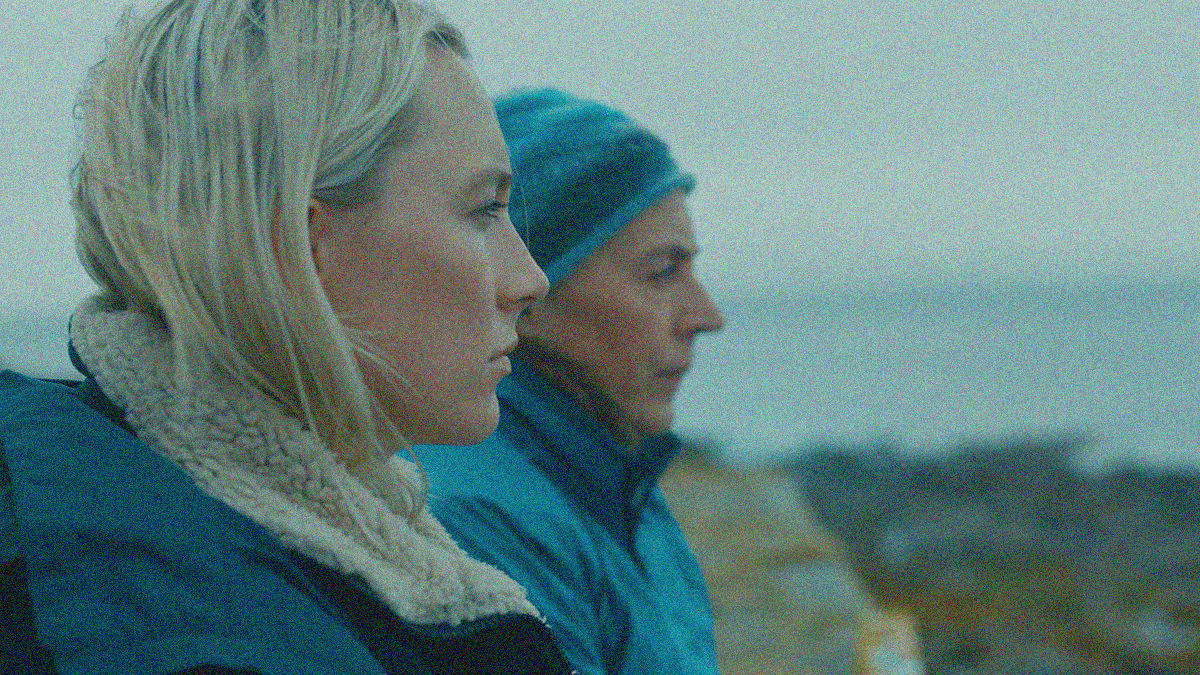
THE OUTRUN
(VOD/Digital HD)
You must pay attention to the hair. There's blonde Rona (Saoirse Ronan) back when she's dating Daynin (Paapa Essiedu) and gradually falling prey to her addiction. Then there's blue-haired Rona when she's succumbed fully to alcoholism. Finally, there's blonde with blue ends Rona when she's walking her path towards sobriety. The first two styles are in London. The third takes place in Scotland's Orkney Islands with her separated parents (Stephen Dillane's Andrew and Saskia Reeves' Annie). And we move back and forth through them as Rona attempts to heal her emotional wounds, face past demons, and move towards a future of possibility.
Directed and co-written by Nora Fingscheidt from co-writer Amy Liptrot's memoir of the same name, The Outrun unfolds with the usual melodrama that comes from such experiences. There are pre-rehab struggles as she pushes Daynin and her friends away. Coping with boredom on her father's farm and frustration with her mother's newfound embrace of God. And, as the flashbacks to happier times and rock bottom grow steadier, the weakness of being unable to hang on. It's especially hard when the quiet calm comes with parents prone to noise via too much affection (Mom) and too little (Dad when he's struggling manic-depressive spells that kept him in and out of institutions her whole life).
The shifts in time are interesting thematically in that we often don't see the full picture until its impact will prove most powerful from the addition of everything else. They also make it so stretches of the film drag because there's nothing going on while we wait. It makes sense, though, considering we're following a character lost in the deafening silence of addiction's desire. We're craving excitement as much as Rona is, knowing that it might make things worse once it arrives. That's the balance. How to manage the highest highs and lowest lows without succumbing to either. And even as the captioned tally of sober days grows, it only takes one misstep to start back at zero.
I found the film was strongest once that misstep occurs because it's the one portion that feels "now." When she's on that initial road to recovery, it's still new and uncertain and we don't really see any of the work (at least not yet). So, it's drunk Rona to sober Rona with the flip of a switch. Then it's back and forth in a montage that renders her new life as fleeting as the memories of her tragic descent. To therefore watch the relapse and see her retreat even further knowing that the stress of being home was just as triggering as the stress of living in London means we can finally see her attempt to live. Daynin can't be her crutch. Mom and Dad can't either. Going to Papa Westray Island means relying solely on herself to rebuild from the ground up.
It's an impactful journey even with the lulls that ultimately brings us to a point in Rona's life where she's truly severed the past to find a new identity without the alcohol. That third act is probably the slowest as a result since Papa Westray is intentionally drama-free beyond its heavy gales of wind, but it's also the most emotionally resonant because she's making new memories detached from the trauma of her old ones. And you can't go wrong when Ronan is delivering one of her most three-dimensional performances amidst those ebbs and flows. Because we see her Rona at her best and worst through the first two acts while understanding neither is real. Only at the end is she unencumbered by expectations and vices. Only then is she truly free.
- 7/10
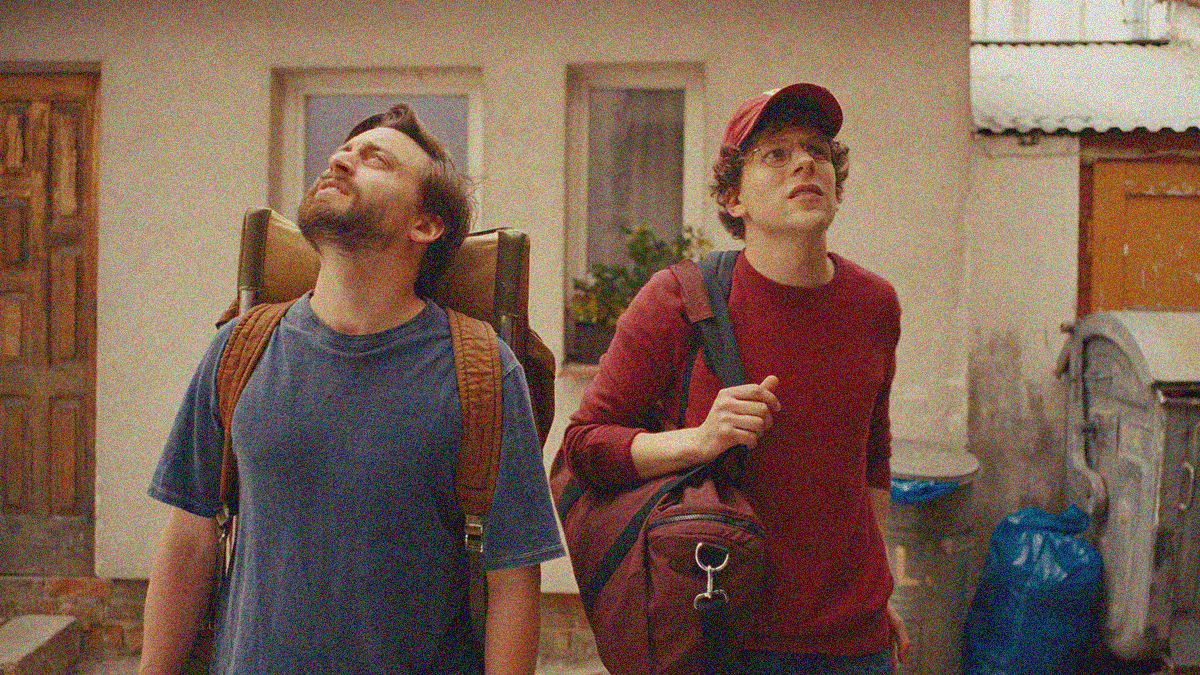
A REAL PAIN
(in theaters)
The first time we see Benji Kaplan (Kieran Culkin) is sitting down inside the airport with a thousand-yard stare that doesn't seem like it would be easy to break. We don't yet know what haunts him, but it's obvious something does. And because we get that shot before his manic reunion with cousin David (Jesse Eisenberg), the whole over-the-top excitement carries a deeper level of distraction and avoidance. So too does his penchant for forgetting what it is he's currently doing and/or the origin of things in his possession. Benji isn't trying to steal David's trail mix. He's just so prone to dissociative behavior that he genuinely believes the bag being in his hand means it's his.
Eisenberg—who also writes and directs—needs us to see this at the start of A Real Pain as preparation for the complex emotions to come. By setting the stage that Benji is more than just the "life of the party" or an "I speak the truth" asshole, we can start to empathize with his struggle and understand he's unwell. David knows this too, but doesn't have the luxury of distance to simply watch the show. Not only must he carry the embarrassment Benji can't despite being the one earning it, but David must also tread lightly as far as triggering a reaction that he's unequipped to handle. Because this isn't just a trip to Poland to visit the home their grandmother lived in before the war. It's a wellness check.
What a captivating way to provide it too: a Holocaust tour featuring a mix of characters with their own unique suffering. Eloge (Kurt Egyiawan) survived a genocide in Africa before coming to Canada and converting to Judaism. Marcia (Jennifer Grey) is seeking a reset of her identity, leaving a world to which she felt she was losing herself to connect back to her roots. Mark (Daniel Oreskes) and Diane (Liza Sadovy) are looking to do the same with a more tourist-y vibe despite still carrying the weight of the experience. And Benji and David are just two kids on vacation. Yes, they feel the history and horror, but they're third generation Americans born with certain advantages that were supposed to guarantee success. So, why is Benji so tortured?
Maybe it's a bit of generational trauma. Maybe it's psychological distress. Maybe he just feels alone. The crucial fact of the matter is that the reason is inconsequential. Just because you might assume someone in his position doesn't deserve to feel pain when compared to the others on this tour doesn't mean it's not real or that it hasn't pushed him to the edge. This is a lost man who possesses the charm to engage a room of strangers into letting him hide from his sorrow. Maybe that's the actual reason why he always wanted to pull an all-nighter on-the-town with David when they were younger. Not to necessarily have fun, but to avoid the nightmarish thoughts that come when he's alone and asleep.
Credit their tour guide James (Will Sharpe) for handling the tumultuous highs and lows since he doesn't have the luxury to just stand in awkward silence like the others when Benji flies off the handle. There are a lot of moments here when everyone must walk on eggshells so as not to make matters worse as if anything they've done has been the reason. Benji might act as though something has sparked an outburst, but, as we later learn, he's not completely present in those instances. They erupt out of fear and discomfort. They begin when he's drowning in a sea of internal chaos that he can only alleviate by making it external instead. Give him a couple minutes and it's like nothing even happened.
It's a heartbreaking performance—one we saw glimpses of during "Succession" whenever Culkin's Roman Roy was presented with the reality that what he wants might not be worth the terror of going against his father. That same haunted look of panic exists in Benji too, but with a heavier weight on his soul that cannot be as easily confused with cowardice. Because he can't escape himself. He can't remove himself from the feelings of isolation and uncertainty that come from being alone. It's why he wants to spend so much time in the airport "meeting crazy people" or searching for rooftops to smoke pot. As long as he's moving, the pain can't settle. And if he's too busy cracking jokes or causing a fuss, the horrible things he's telling himself can't be heard.
Kudos to Eisenberg for finding the sensitivity to not only write this character with such depth of humanity, but also to reject easy answers or solutions for him. Whereas lesser work would have David's presence become the salve that saves Benji's life, A Real Pain knows how patronizing doing so would be. The best his character can do—the best any of us can do—is make certain the person in pain knows they love them and are around whenever they need them. Smothering his cousin would prove just as damaging as ignoring him completely. David will just have to live with the worry. And Benji will have to keep fighting to deal with the anguish, guilt, and self-loathing. We all have pain to manage.
- 8/10
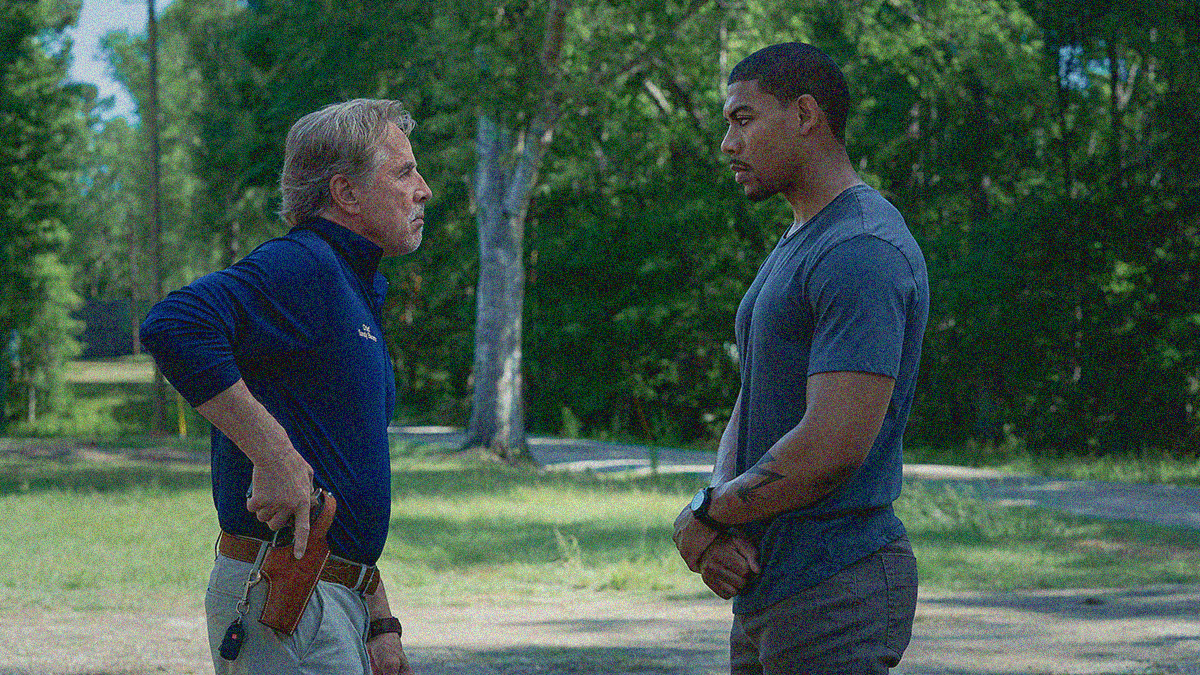
REBEL RIDGE
(streaming on Netflix)
It's a fantastic opening scene. Officer Evan Marston (David Denman) revs his engine to rear-end cyclist Terry Richmond (Aaron Pierre) into a full-on wipeout crash onto the pavement. Before the latter even clocks what's happening, the former is on him with cuffs out while relaying over his walkie talkie that the pursuit has ended. Terry has no clue what he's talking about. He didn't even know someone else was on the road. Why? Because his metal mix was blaring in his ears—a legitimate no-no when it comes to operating a road-worthy vehicle beholden to traffic laws. Did it warrant this level of violence, though? No.
Add the obvious racial aspect of Marston and his partner (Emory Cohen's Officer Steve Lann) being white cops and Terry being Black and the whole situation carries a level of uncertainty where intent and force are concerned. Because maybe they had probable cause (although riding a bike while Black doesn't suddenly make you a suspect when a random bike gets stolen). Maybe they should question the validity of Richmond's story that the thirty-six thousand dollars in his backpack is to bail out his cousin considering there are countless better ways to transport so much through an obviously aggressive hick town. They still could have corroborated his story before confiscating it.
Writer/director Jeremy Saulnier can't let them, though, because it's not about justice. It's about exploiting the law for a chance to add that money to the department's discretionary budget. As law clerk Summer McBride (AnnaSophia Robb) explains, getting it back once it's been impounded would cost Terry more in legal fees than it's worth. So, Chief Sandy Burnne's (Don Johnson) men bank on never being called out on their scam. Richmond isn't their usual target, though. He's on a clock since his cousin is about to be transferred to a prison with inmates who know he snitched on their boss. He doesn't care if Burnne takes the cash as long as he also keeps his cousin safe.
In a perfect world, Rebel Ridge is over in thirty minutes. Burnne satisfies his greed and Terry protects his family until the trial gets dismissed with what everyone seems to agree are trumped-up charges. Well, this isn't a perfect world and that threat of racial disharmony is only exacerbated when the white perpetrator feels he's been called out and "given a favor" by his victim while those under his command are watching. So, instead of doing the smart thing and making this as much of a win-win scenario as it can be, Burnne escalates things further. Why? Because he doesn't fully understand Richmond's military jacket. He doesn't realize who it is he's cornered.
The First Blood vibes are obvious. Here's a veteran just trying to live his life when he gets roped into a conflict he didn't want but has the ability to win. And just like that opening scene exists in a gray area as far as legality is concerned, so too do the "compromises" presented afterwards once Terry is forced to reveal his true might. Yes, he's offered a way out, but what is the silence of that arrangement actually hiding? That they used excessive force and stole his money? Or that Terry, and his cousin for that matter, isn't the only one who's suffered by their hands? This very quickly shifts from a wronged party seeking justice to a full-blown conspiracy he's in the position of burning to the ground.
Equal parts suspense thriller gathering evidence and action film relying on close-up combat that never threatens deadly force until the inevitable finale, Saulnier's script is always moving us forward with high stakes scenarios that cannot be subdued without a fight. That's why there's always a clock whether it be Terry's cousin's transport, Summer's career, or his own life. He doesn't have the time or space to figure out a better option beyond going straight through. And while the opposition thinks they are up to the task (via inflated egos and lopsided numbers), they eventually find themselves getting in their own way. Or, I should say, in Burnne's way. Because they're all expendable to him.
Johnson is very good. Rather than a flashy villain, his Burnne is calm and cool. He doesn't think he has to worry because he's kept a lid on his activities so long and with so many accomplices that a sneeze would trigger mutually assured destruction. Even when his back is against the wall, he believes he's able to both survive and trick his opponent into giving up the upper-hand. It's why making Terry an outsider is critical to the whole. He has no vested interest in any of it until they give him a reason. If Pierre wasn't already on his way to stardom (his casting as John Stewart in "Lanterns" would agree), this performance will pave the way. It provides the chance to showcase his compassion from Brothers and the physicality Hollywood adores. He delivers on both.
- 9/10
Cinematic F-Bombs:
This week saw 2012 (2009), IN TIME (2011), LAKEVIEW TERRACE (2008), and A QUIET PLACE: DAY ONE (2024) added to the archive (cinematicfbombs.com).
Patrick Wilson and Samuel L. Jackson dropping f-bombs in LAKEVIEW TERRACE.
New Releases This Week:
(Review links where applicable)
Opening Buffalo-area theaters 12/06/24 -
FOR KING + COUNTRY’S: A DRUMMER BOY CHRISTMAS LIVE at Regal Elmwood, Transit, Galleria & Quaker
FLOW at Regal Galleria & Quaker
“It's a beautifully animated and choreographed film with suspenseful life or death moments and effective action. I don't think Flow is quite as captivating a story as Away, but you cannot deny that Zilbalodis has evolved his craft in all other aspects.” – Full thoughts at HHYS.
GET AWAY at AMC Market Arcade; Regal Transit & Quaker
THE ORDER at Regal Elmwood, Transit & Quaker
Thoughts are above.
PUSHPA 2: THE RULE at Regal Elmwood, Transit, Galleria & Quaker
THE RETURN at Regal Elmwood, Galleria & Quaker
RM: RIGHT PEOPLE, WRONG PLACE at Regal Galleria
SOLO LEVELING: REAWAKENING at North Park Theatre; AMC Maple Ridge; Regal Galleria
WEREWOLVES at Dipson Capitol & Flix; AMC Maple Ridge; Regal Elmwood, Transit, Galleria & Quaker
Y2K at Dipson Capitol & Flix; AMC Maple Ridge & Market Arcade; Regal Elmwood, Transit, Galleria & Quaker
Streaming from 12/06/24 -
BEETLEJUICE BEETLEJUICE – Max on 12/6
BIGGEST HEIST EVER – Netflix on 12/6
CAMP CRASHER – Netflix on 12/6
FLY ME TO THE MOON – AppleTV+ on 12/6
MARY – Netflix on 12/6
SUMMER CAMP – Hulu on 12/6
SUPER/MAN: THE CHRISTOPHER REEVE STORY – Max on 12/7
IT’S NOT ME [Livestream] – Criterion Channel on 12/10
NATURE OF THE CRIME – Max on 12/10
SUGARCANE – Disney+/Hulu on 12/10
MAKAYLA’S VOICE: A LETTER TO THE WORLD – Netflix on 12/11
MARIA – Netflix on 12/11
“The whole is imbued with similar flourishes as Larraín's other English-language heightened biographies, Jackie and Spencer, to find its narrative thrust landing somewhere between the former's poetic realism and latter's evocative fantasy.” – Full thoughts at jaredmobarak.com.
RED ONE – Prime on 12/12
Now on VOD/Digital HD -
CARVILLE: WINNING IS EVERYTHING, STUPID! (12/3)
CHRISTMAS EVE AT MILLER’S POINT (12/3)
“[Earnest human connection] is what ultimately prevails considering there's no real plot or desire to follow through on major conflict points with any resolution beyond begrudging acceptance.” – Full thoughts at HHYS.
CLOSE YOUR EYES (12/3)
DOC OF CHUCKY (12/3)
EXHIBITING FORGIVENESS (12/3)
“That's where the difference between effective and transcendent lies—a filmmaker putting truth ahead of convenience in a way that allows the characters to accept the past without fear or denial. It happened and it mattered, but it's no longer in control.” – Full thoughts at HHYS.
JUROR #2 (12/3)
KNOW YOUR PLACE (12/3)
WEEKEND IN TAIPEI (12/3)
YOU & I (12/3)
GOOD ONE (12/6)
“The thing that strikes me most about India Donaldson's GOOD ONE is just how effective the script is at building towards its final act of rebellion. It's a subtle yet powerful transition that recolors everything in the lead-up.” – Full thoughts at HHYS.
INVISIBLE RAPTOR (12/6)
LAKE GEORGE (12/6)
YOU ARE NOT ME (12/6)





